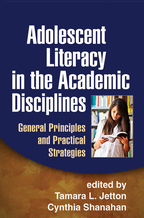Adolescent Literacy in the Academic Disciplines
General Principles and Practical Strategies
Edited by Tamara L. Jetton and Cynthia Shanahan
Paperbacke-bookprint + e-book
Paperback
orderJanuary 23, 2012
ISBN 9781462502806
Price: $41.00 274 Pages
Size: 6" x 9"
From leading authorities in both adolescent literacy and content-area teaching, this book addresses the particular challenges of literacy learning in each of the major academic disciplines. Chapters focus on how to help students successfully engage with texts and ideas in English/literature, science, math, history, and arts classrooms. The book shows that while general strategies for reading informational texts are essential, they are not enough—students also need to learn processing strategies that are quite specific to each subject and its typical tasks or problems. Vignettes from exemplary classrooms illustrate research-based ways to build content-area knowledge while targeting essential reading and writing skills.
“This volume rewards the interested reader many times over. The editors offer a classic blend of accomplished authors providing important insights on a topic of great value. The book addresses both theory and practice. It describes not only how students construct meaning in the different content domains, but also how they use this constructed meaning in discipline-related acts of literacy. The evolution in understanding disciplinary literacy is reflected in the Common Core State Standards and the National Assessment of Educational Progress; this book provides the means to meet the demand for high-quality teaching in this area.”
—Peter P. Afflerbach, PhD, Department of Curriculum and Instruction, University of Maryland
“Meeting the needs of current and future teachers alike, this book makes explicit what many educators take for granted—the notion that middle and high school students must learn to read, write, and think in qualitatively different ways when entering into content-area classrooms. It provides background knowledge about the habits of mind held by experts and teachers in each content area, as well as specific information about teaching adolescents to adopt those habits of mind and ways of reading. As undergraduate and graduate coursework in teacher preparation programs increasingly focus on content-area literacy, this book will surely be of great use as a text.”
—Jacy Ippolito, EdD, School of Education, Salem State University, Massachusetts
“Many secondary literacy coaches I have worked with—most of whom are former English teachers—lack a clear understanding of how literacy works in mathematics, history, science, and other content-area classrooms. This book provides much-needed background on literacy in disciplinary contexts, not only for literacy coaches in junior high and high schools, but also for teachers, administrators, and researchers. It is an exciting time in adolescent literacy, and this volume is an important contribution.”
—Leslie S. Rush, PhD, Department of Secondary Education, University of Wyoming
Table of Contents
1. Learning from Text: Adolescent Literacy from the Past Decade, Tamara L. Jetton and Richard Lee2. The Challenges of Reading Disciplinary Texts, Zhihui Fang
3. How Disciplinary Experts Read, Cynthia Shanahan
4. A Model for Teacher Planning with Text in the Academic Disciplines, Tamara L. Jetton and Richard Lee
5. Learning with Text in English/Language Arts, Troy Hicks and Susan Steffel
6. Learning with Text in Science, Cynthia Shanahan
7. Reconceptualizing Literacy and Instruction for Mathematics Classrooms, Daniel Siebert and Roni Jo Draper
8. Learning with Texts in History: Protocols for Reading and Practical Strategies, Bruce VanSledright
9. Learning with Text in the Arts, Kathleen Moxley, James Batcheller, Larry Burditt, Sue Gamble, Alan J. Gumm, Johanna Paas, and Judy Thurston
About the Editors
Tamara L. Jetton, PhD, is Professor in the Department of Teacher Education and Professional Development at Central Michigan University. A former public school teacher for 10 years, she is interested in three particular areas of literacy: strategic reading to improve comprehension in the academic disciplines, learning through classroom discussions, and writing processes. Her research and publications mirror these interests. Dr. Jetton has dedicated her professional career to the goal of helping teachers improve the reading comprehension of adolescents who struggle in the academic disciplines.Cynthia Shanahan, EdD, is Professor of Literacy, Language and Culture; Executive Director of the Council on Teacher Education; and Associate Dean of Academic Affairs at the University of Illinois at Chicago. In her role as professor, Dr. Shanahan prepares preservice and inservice teachers to teach middle and high school literacy. She previously taught college students to meet the reading and study demands of their college courses at Georgia State University and the University of Georgia. Her research and teaching interests are in disciplinary literacy.
Contributors
James Batcheller, DMA, School of Music, Central Michigan University, Mount Pleasant, MichiganLarry Burditt, MFA, Department of Art and Design, Central Michigan University, Mount Pleasant, Michigan
Roni Jo Draper, PhD, Department of Teacher Education, Brigham Young University, Provo, Utah
Zhihui Fang, PhD, School of Teaching and Learning, University of Florida, Gainesville, Florida
Sue Gamble, EdD, School of Music, Central Michigan University, Mount Pleasant, Michigan
Alan J. Gumm, PhD, School of Music, Central Michigan University, Mount Pleasant, Michigan
Troy Hicks, PhD, Department of English Language and Literature, Central Michigan University, Mount Pleasant, Michigan
Tamara L. Jetton, PhD, Department of Teacher Education and Professional Development, Central Michigan University, Mount Pleasant, Michigan
Richard Lee, Department of Teacher Education and Professional Development, Central Michigan University, Mount Pleasant, Michigan
Kathleen Moxley, PhD, Department of Teacher Education and Professional Development, Central Michigan University, Mount Pleasant, Michigan
Johanna Paas, MFA, Department of Art and Design, Central Michigan University, Mount Pleasant, Michigan
Cynthia Shanahan, EdD, Council on Teacher Education, College of Education, University of Illinois at Chicago, Chicago, Illinois
Daniel Siebert, PhD, Department of Mathematics Education, Brigham Young University, Provo, Utah
Susan Steffel, PhD, Department of English Language and Literature, Central Michigan University, Mount Pleasant, Michigan
Judy Thurston, MA, Department of Art and Design, Central Michigan University, Mount Pleasant, Michigan
Bruce VanSledright, PhD, History/Social Studies Education Program, University of Maryland, College Park, Maryland
